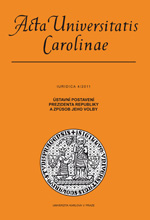Zavádzanie priamej voľby prezidenta na Slovensku a jeho dôsledky
Zavádzanie priamej voľby prezidenta na Slovensku a jeho dôsledky
Author(s): Pavol Juhás, Marian HorváthSubject(s): Law, Constitution, Jurisprudence
Published by: Univerzita Karlova v Praze, Nakladatelství Karolinum
Keywords: president; constitution; direct elections; Slovak republic; powers; government
Summary/Abstract: The introduction of direct election of the head of state in the Slovak Republic was the result of major political change after the elections in 1998. This topic became one of the key domestic political issues, which was also announced in 1997 in a referendum. By the decision of the Constitutional Court the referendum was claimed as thwarted. Despite that the new political elite anchored it in the Constitution which ended more than a season without filling the post after the first term of President Michal Kováč. We may conclude that their implementation was preceded by relatively extensive professional and general discussion, and that the introduction of direct election was accepted by a significant majority of Slovak citizens. Despite the strengthening of the mandate of the President, however, there was a gradual diminution of his real powers. Direct selection meant thus strengthening, but tends to weaken this post. Although the candidate is not elected by the MP s and the party headquarters, but it is the citizens’ vote; none of the previous direct elections had a real chance to elect a candidate outside the strong support of political parties. The main advantage of the introduction of direct election is that eventually someone will always be chosen, and thus it will not repeat the situation of the years 1998–1999.
Journal: Acta Universitatis Carolinae Iuridica
- Issue Year: 57/2011
- Issue No: 4
- Page Range: 115-128
- Page Count: 14
- Language: Slovak

